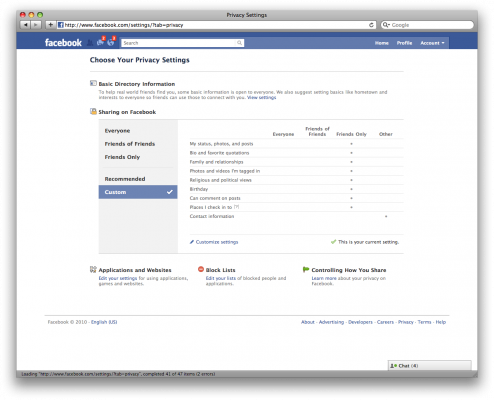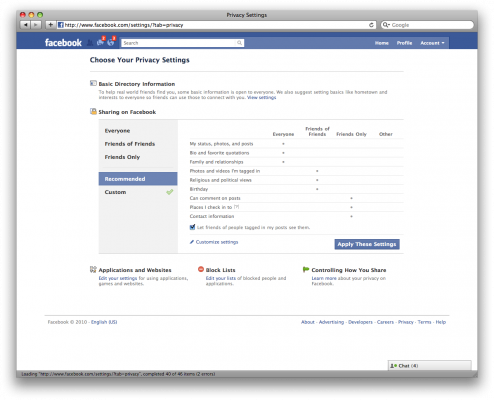Facebook’s “Privacy Settings” always seem to be a work in progress. One thing they do consistently is default to less privacy overall, thus more sharing of your information on their site. For a website that depends on user-generated content the motivation to encourage sharing is clear enough. Still, why do they use the word “privacy” if they’re not actually embracing the idea?
For example, a recent update introduces a table with degrees of privacy from less to more (left to right). Types of data are listed in rows, while access is shown in the columns, with Everyone to Friends Only, again left to right.
Curious about what Facebook “Recommended” settings were, I clicked and am sharing the screenshot below. I am not surprised to see that they wish me to open-up all content I generate; status messages, posts, images, etc. and discourage allowing anyone I don’t know to comment on posts (probably as spam prevention).
I have been thinking about privacy quite a bit this week, developing ideas for what next to do with Give Me My Data, and providing an interview about social media for Naked on Pluto (along with the likes of Marc Garrett and Geert Lovink). Plus I went to see the “geek hero story” The Social Network at the Babylon Cinema last night.
Anyway, after all this thinking about Facebook’s past, I’m curious about its future, and how it will continue to try to hold on to the #1 social networking website position that Friendster and MySpace lost so quickly. The API, games, etc could be expected, but the Facebook Connect tools that are so prevalent now, even on Yelp, a site I figured could make it without schlepping, were a surprise.
Facebook Connect, a jquery “widget” that allows you to login to other websites using your Facebook ID, is clever and eerie at once. It allows Facebook to track you when you are not even on their site, and make sure you stay loyal. If that sounds sinister, well it is. What other purpose could there be for making available a service with the single purpose of mediating every interaction or bit of content you add to the web? It seems at first like OpenID, and it is, except that its run by a multi-billion dollar social media corporation.

